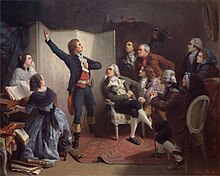Клод Джозеф Руже де Лисл
Клод Джозеф Руже де Лисл | |
|---|---|
 Лисл Руже в 1835 году | |
| Рожденный | 10 мая 1760 г. Лонс-ле-Саньер , Франция |
| Умер | 26 июня 1836 г. (в возрасте 76 лет) Choisy-le-roi , Sene-et-oise , Франция |
| Allegiance | France |
| Service/ | French Army |
| Years of service | 1784–1793 |
| Rank | Captain |
| Awards | Chevalier. Legion of Honour (1831)[1][2] |
| Other work | Chant de guerre pour l'armée du Rhin, "La Marseillaise" |
Клод Джозеф Руже де Лисл [ А ] ( Французский: [klod ʒozɛf ʁuʒɛ d (ə) lil] ; 10 мая 1760 - 26 июня 1836 г.) был офицером французской армии во французских революционных войнах . Остров известен тем, что пишет слова и музыку пения де Герре Поли Л'Армей -дю -Рейн , который впоследствии будет известен как Ла Марсельиз и станет гимном Франции . [ 4 ]
Ранний период жизни
[ редактировать ]Rouget de Lisle родился в Lons-le-Saunier , по общему мнению в рыночный день. Его родители жили в соседней деревне Монтайгу . [ 5 ] Доска была размещена в точном месте его рождения и статуя, установленная в центре города в 1882 году. Он был старшим сыном Клода Игнас -Руже (5 апреля 1735 - 6 августа 1792 года) в Оргиле и Жанны Мадлен Гайлленде (2 июля 1734 г. - 20 марта 1811 года). [ 6 ]
In 1784, he was initiated into "Les Frères discrets", a masonic lodge in Charleville, just after being promoted officer.[7]
Career
[edit]
He enlisted into the army as an engineer and attained the rank of captain. A royalist like his father, he refused to take the oath of allegiance to the new constitution.[1] Rouget de Lisle was cashiered and thrown into prison in 1793, narrowly escaping the guillotine.[4] He was freed during the Thermidorian Reaction and retired to Montague.[1]
La Marseillaise
[edit]
The song that has immortalized him, "La Marseillaise", was composed at Strasbourg, where Rouget de Lisle was garrisoned in April 1792. However, another composition with the same tune [8] was composed 11 years before by the Italian composer Giovan Battista Viotti at the court of Marie Antoinette. France had just declared war on Austria, and the mayor of Strasbourg and worshipful master of the local masonic lodge, baron Philippe-Frédéric de Dietrich, held a dinner for the officers of the garrison, at which he lamented that France had no national anthem. Rouget de Lisle returned to his quarters and wrote the words in a fit of patriotic excitement. The piece was at first called Chant de guerre pour l'armée du Rhin ("War Song for the Army of the Rhine") and only received its name of Marseillaise from its adoption by the Provençal volunteers whom Barbaroux introduced into Paris and who were prominent in the storming of the Tuileries Palace on 10 August 1792.[4][2]
After the war, Rouget de Lisle wrote a few other songs of the same kind as the "Marseillaise", and in 1825 he published Chants français (French Songs) in which he set to music fifty poems by various authors. His Essais en vers et en prose (Essays in Verse and Prose, 1797) contains the Marseillaise; a prose tale Adelaide et Monville of the sentimental kind; and some occasional poems.[4] He returned to public life after the July Revolution and was awarded the Legion of Honour by Louis Philippe I.[2]
Death
[edit]
Rouget de Lisle died in poverty in Choisy-le-Roi, Val de Marne.[9] His mortal remains were transferred from Choisy-le-Roi cemetery to the Invalides on 14 July 1915, during World War I.[9][10][11]
Notes
[edit]References
[edit]- ^ Jump up to: a b c Harry Thurston Peck, Frank Richard Stockton, Nathan Haskell Dole, Julian Hawthorne, Caroline Ticknor: The World's Great Masterpieces (American Literary Society, 1901), p. 9577.
- ^ Jump up to: a b c The New York Times Current History: The European War, Volume 16, 1918. p. 200.
- ^ Brian N. Morton, Donald C. Spinelli, Beaumarchais and the American Revolution (Lexington Books, 2003), p. 303, ISBN 9780739104682.
- ^ Jump up to: a b c d Chisholm 1911.
- ^ Lons, une "petite" ville en lettres capitales at La Terre de chez nous (in French) 10 April 2004; retrieved 7 August 2013.
- ^ Family Tree Rouget
- ^ Dictionnaire Universelle de la Franc-Maçonnerie, ed. Jode and Cara (Larousse, 2011).
- ^ Camerata Ducale & Guido Raimonda. Giovan Battista Viotti: Tema e Variazioni in Do Maggiore [1]
- ^ Jump up to: a b Norman Davies: Europe: A history, p. 718.
- ^ The Marsellaise. Honouring its author Hawera & Normanby Star 26 October 1915, at National Library of New Zealand
- ^ Tribute to Composer The Argus (Australia), 16 July 1915, p. 7, at Trove.
Sources
[edit]- This article incorporates text from a publication now in the public domain: Chisholm, Hugh, ed. (1911). "Rouget de Lisle, Claude Joseph". Encyclopædia Britannica. Vol. 23 (11th ed.). Cambridge University Press. p. 770.
Further reading
[edit] Texts on Wikisource:
Texts on Wikisource:
- Free scores by Claude-Joseph Rouget de Lisle at the International Music Score Library Project (IMSLP)
- 1760 Рождения
- 1836 Смерть
- Классические композиторы 18-го века
- Французские поэты 18-го века
- Французские музыканты 18-го века
- Французские писатели 18-го века
- Классические композиторы 19-го века
- Французские драматурги и драматурги 19-го века
- Французские поэты 19-го века
- Французские музыканты 19-го века
- Рыцари почетного легиона
- Французские композиторы классического периода
- Французские масоны
- Французские классические композиторы мужского пола
- Французские заключенные и задержанные
- Французские романтические композиторы
- Национальные писатели гимна
- Люди из Юры (отдел)
- Народ французской революции
- Заключенные и задержанные Франции